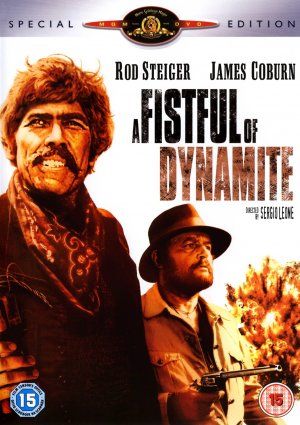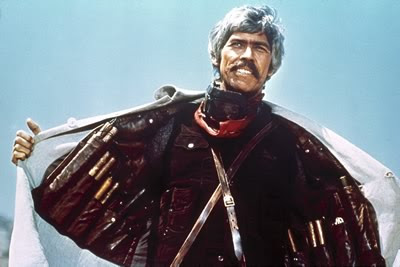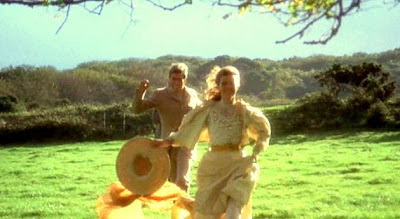A tongue-in-cheek satire on Revolutions
A Potpourri of Vestiges Review |
Duck, You Sucker! (1971) - By Sergio Leone
|
Our Rating: 9.5
IMDb Ratings: 7.6
Genre: Adventure | Western
Cast: Rod Steiger, James Coburn, Romolo Valli
Country: Italy
Language: Italian | Spanish
Language: Italian | Spanish
Runtime: 154 min (uncut)
Color: Color (Eastmancolor)
Summary: An IRA explosives expert on the run in Mexico meets an amoral Mexican bandit; together they get drawn into the Mexican revolution.
Duck, You Sucker! (Italian: Giù la testa), also known as A Fistful of Dynamite and Once Upon a Time… the Revolution, is master Italian
filmmaker Sergio Leone’s fifth and final Spaghetti Western film—the others
being the “Dollars Trilogy” comprising A Fistful of Dollars (1964), For a Few Dollars More (1965), The Good, the Bad and the Ugly (1966), and Once Upon a Time in the West (1968). Duck, You Sucker! stars Rod Steiger and James Coburn in
the lead roles. Since the movie is set in the backdrop of the Mexican
Revolution of Pancho Villa and Emiliano Zapata a more accurate classification of
it would be as Zapata Western—a subgenre of Spaghetti Western quite popular
during the mid-1960s and the early 1970s with its ostentatious and rather
macabre depiction of grotesqueries of the Mexican Revolution of 1913. Duck, You
Sucker! is an underrated gem that undoubtedly features amongst the best works of
Sergio Leone. The movie
was butchered by the studios at
the time of its release but the uncut 154-minute restores the lost glory by presenting
it in its pristine form. Anyone
who has seen the "Dollars Trilogy" can easily mistake Leone for a
mere showman, but those who have had the privilege of watching his more
personal works like Once Upon a Time in America (1984)—another of Leone’s masterpieces
that was ignominiously sabotaged by the studios—would know better.
Leone was indeed a master showman but one who
knew too well how to blend huge dozes of style with equal portions of substance
so as to conjure up piquant potions that appealed to the palates of the masses
and the aficionados alike. Even in the "Dollars Trilogy" where style
clearly is the real driver, deep down there is strong sense of realism that a
keen eyed viewer wouldn't find hard to discern. The conspicuous levity only
serves the purpose of a translucent film used to hide the lurid reality so as
to protect an uninitiated viewer from getting jumpy at its naked sight. In
Duck, You Sucker!, this translucent film only happens to be a fraction more
transparent than usual. In other words, Leone chooses to be a bit more direct
and stark in his presentation of realism (most evident in the ghastly firing
squad sequences), probably taking a leaf out of Sergio Corbucci’s book. In that
regard, the movie happens to be Leone's darkest work. Duck, You Sucker! is replete
with Leone’s characteristic showmanship, but there are also strong undercurrents
of irony—to mourn the atrocities of war—and dark humor—to mock the human greed
and selfishness—which makes it a nigh perfect amalgamation of style and
substance.
Duck, You Sucker! presents the tale of a Mexican
bandit and an Irish dynamite expert whose lives get intertwined amidst the
turmoil of the Mexican Revolution. The only thing that unites these two contrasting
personalities is their name: while the former is named Juan (Rod Steiger) the latter is named John (James Coburn). Juan sees this coincidence as a divine signal. That their
union is meant to serve a much greater purpose: to rob the great bank of Mesa
Verde. The loquacious Juan desperately tries to convince the taciturn John, but
the later remains uninterested. What follows is a tantalizing game of cat and
mouse between Juan and John as the two try their best to outwit each other only
to be united by an eternal bond of friendship. Like any quintessential
Leone film, there are scenes in Duck, You Sucker! that will stay with the viewer forever. There are dialogues/monologues that
will leave a lasting impact on the viewer. The movie has certain unspoken lines
(propagated through the means of non-verbal gestures) that cast an even greater spell on the viewer, viscerally as well as
intellectually.
Juan's following commentary on his own
understanding of the term "revolution" is indeed the most powerful
amongst the movie’s various verbal deliveries: “I know what I am talking about
when I am talking about the revolutions. The people who read the books go to
the people who can't read the books, the poor people, and say, 'We have to have
a change.' So, the poor people make the change, ah? And then, the people who
read the books, they all sit around the big polished tables, and they talk and
talk and talk and eat and eat and eat, eh? But what has happened to the poor
people? And what happens to the poor people? They are dead! That's your
revolution. Shhh... So, please, don't tell me about revolutions! And what happens
afterwards? The same f**king thing starts all over again!” A near second would
be the one when a caged bird defecates on Juan's head and the bandit looks up
and says: "For the rich, you sing!" In keeping up with his reticence,
John only responds non-verbally to Juan’s fiery discourse on the paradox of
revolution by throwing away Michael Bakunin’s famous book “Letters on
Patriotism”—which he had been previously reading—in the mud. The combined effect
of Juan’s verbal discourse and John’s non-verbal approval exemplifies what can
be done in front of the motion picture camera and is so rarely done. Then there’s
the movie’s splendid opening stage-coach sequence that will remain etched in
the viewer’s memory forever.
During his career, Leone could only make a
handful of movies, but such was his mastery over his art that each one of them is
a masterpiece within its own right. Leone started off by imitating Japanese
filmmaker Akira Kurosawa's filmmaking style but gradually succeeded in
developing his own trademark. Leone's first major work was A Fistful of Dollars
(1964)—a rip-off of Akira Kurosawa's 1961 samurai flick, Yojimbo. Leone’s
credibility as a filmmaker was jolted when Kurosawa sued the production house
for copyright infringement. Leone, however, bounced back with For a Few More
Dollars. And the rest is history! Leone's innovative style and technical brilliance
added a whole new dimension to cinema. His collaboration with master composer
Ennio Morricone and cinematographer Tonino Delli Colli led to a paradigm shift
in filmmaking. Leone’s works are marked by the distinct closeups, ultra-closeups,
long continuous shots (with quick panning and un-panning of the terrain), and
rotating camera shots with Morricone’s mellifluous music playing in the
background. Such is the richness of Leone’s cinema is that aspiring filmmakers,
screenwriters, cinematographers, composers, and various technicians can all
gain a lot out of it. In fact, students of cinema can look upon Leone’s works as their first lesson in filmmaking.
Overall, Duck, You Sucker! serves to be a great
social commentary on war, politics, and human exploitation. The movie can also be looked upon as a treatise on greed, cowardice, heroism, and friendship.
Leone essentially presents a tale of two men: one naïve and one intellectual
wherein the naïve one teaches the intellectual a lesson convincing him to throw
away Bakunin’s book which was the very symbol of his belief in the endless
promises made to him by his fellow intellectual men. Duck, You Sucker! had strangely
failed to impress this critic during the first viewing. But, the second viewing
(after almost a gap of three years) proved to be much more fruitful. And the third
viewing helped further strengthen the critic’s belief that Duck, You Sucker! is Sergio
Leone's second best work that’s bettered only by his magnificent swansong, Once
Upon a Time in America. Duck, You Sucker! features an unforgettable performance
from the great Rod Steiger. Steiger is well complemented by James Coburn who arguably delivers his best performance ever. The duo shares great onscreen chemistry and it's an absolute treat to watch these two veteran performers express themselves with absolute panache and aplomb. Steiger's breathtaking portrayal of Juan Miranda is highly reminiscent of Eli Wallach's portrayal of the enigmatic Tuco in The Good, the Bad and the Ugly. The movie's use of non-verbal language is probably as strong
as the use of verbal language: best demonstrated by Steiger's expressions of
elation, shock, disgust and self-pity at different points in the movie. Master
composer Ennio Morricone writes another mesmerizing score for Leone. Morricone’s
hypnotic music very much forms the backbone of the movie. Duck, You Sucker! serves to be an elixir for any intelligent viewer and offers enough food for thought to
keep him occupied long after the film is over.
References:
Previous Review: Hannibal (2001)
Next Review: The Damned (1969)
 |
| Rod Steiger as the Mexican bandit Juan Miranda in Duck, You Sucker! |
 |
| James Coburn as John H. Mallory in Duck, You Sucker! |
 |
| A Still from Sergio Leone's Duck, You Sucker! |
 |
| A Still from Sergio Leone's Duck, You Sucker! |
 |
| James Coburn and Rod Steiger in Duck, You Sucker |
 |
| Juan Miranda faces the Firing Squad in Duck, You Sucker! |
Readers, please feel free to share your opinion by leaving your comments. As always your feedback is highly appreciated!
For Best Films by Sergio Leone, please click here
For Best Films by Sergio Leone, please click here
Duck, You Sucker (1971) Trailer
Next Review: The Damned (1969)
People who liked this also liked...







This is a classic film. And you have written a great review.
ReplyDeleteI like the fact that Eli Wallach as supposed to play the Rod Steiger role, but was stopped from doing so because of the producers, because he was a lesser name.
Thanks a lot for those kind words. Duck, You Sucker is indeed a classic.... a masterpiece to to be precise. The producers made an interesting choice by opting for Steiger. While Wallach too would have done justice to the part, it would have more or less appeared like an encore of his memorable performance in The Good, the Bad and the Ugly. Steiger surely brought in something extra. The commercial success of Dollars Trilogy meant that the studios were willing to spend much bigger sums (The budget for the opening scene of Once Upon a Time in the West alone was almost as large as the budget sanctioned for the entire filming of The Good, the Bad and the Ugly). And obviously they wanted to have a better control over critical commercial parameters like casting. Wallach wasn't as big a name as Steiger at the time and so Wallach's ouster wasn't a big surprise.
ReplyDeleteOf course, Ali. I agree with your viewpoint one hundred percent. Rod played his part very-well indeed. Better than expected, considering that he didn't like Sergio's personality all that much. As they disagreed a lot on the set.
ReplyDeleteIt's just nice to know the origin of Rod's 'Tuco', huh? Makes for a nice zing.
I am glad you do. Like all true auteurs, Sergio Leone was a difficult person to work with. The fact that he couldn't speak English must have made the matters worse (especially with highly accomplished actors like Steiger who could speak neither Italian nor French).
ReplyDeleteGreat review!
ReplyDeleteWe're linking to your article for Spaghetti Western Tuesday at SeminalCinemaOutfit.com
Keep up the good work!
Glad you liked it... would love to hear more about Spaghetti Western Tuesday!!! :-)
ReplyDeletemy favorite leone film. a masterpiece. sad, deep, an intellectual film. awesome.
ReplyDeleteThanks for sharing your thoughts. It's indeed a masterpiece... it's also Leone's most introspective film... the movie features a heart-wrenching performance from the great Rod Steiger.
ReplyDeleteMurtaza, I have read your review several times now. It is superb and knowledgeable. Simply excellent. Most respectfully, I would disagree with only this comment: "Leone essentially presents a tale of two men: one naïve and one intellectual wherein the naïve one teaches the intellectual a lesson convincing him to throw away Bakunin’s book which was the very symbol of his belief in the endless promises made to him by his fellow intellectual men." My thoughts are a little different: I think if there is any hope that comes from the film it is about the possibility of change. Juan is more than naive, he is a rapist and an ugly person, in his own way co- conspiring with the corruption all around him, albeit with a few redeeming qualities such as loyalty to his family. This is as we find him at the beginning. In the end he is much different, and this is due to John who is burned out and done with life and loses his own through the virtue of sacrifice, and who shows the ugly bandit at least the possibility of hope in spite of chaos and unending waste. Juan has indeed show a capacity himself to learn and to change, no small things. But this possibility is only a possibility, the world is thoroughly corrupt. Duck you Sucker reminds me of another profoundly intellectual and very sad film, expressing magnificently the same themes, and not just because of the "same sounding," haunting soundtrack: Platoon. High praise indeed.
ReplyDeleteps: Duck you Sucker has a wonderful sense of humor at times, whereas Platoon, not much at all. I think Morricone's score is a masterpiece itself. What a genius he was..............
ReplyDelete